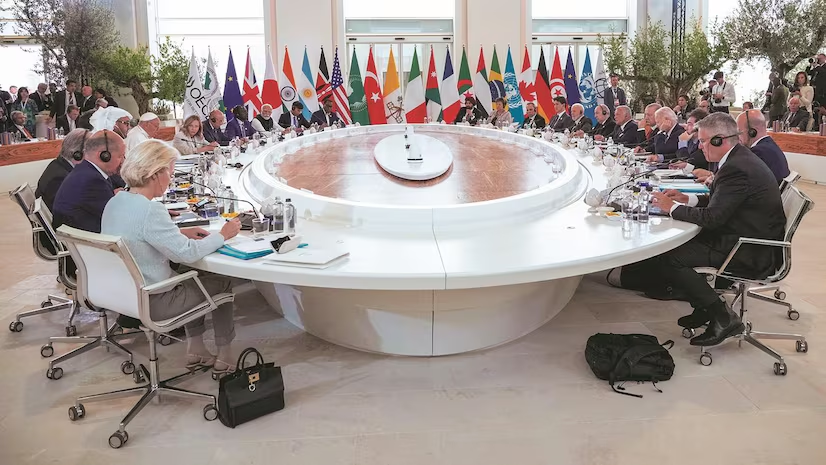Imperative re-orientation

With its persistently depleting clout and all the vulnerabilities, the 50th G7 Summit in Apulia, Italy, appears to have opted-for a much-needed reorientation. The grouping has made a conscious shift in focus towards deeper engagement with the Global South. Historically, the G7 has been perceived as the steward of the global economy, representing the world's most advanced democracies. However, the Apulia Summit reflected an essential understanding that progress cannot be achieved in isolation from the Global South. The inclusion of leaders from Brazil, Argentina, the UAE, Turkey, Jordan, Algeria, Kenya, Tunisia, Mauritania and, most importantly, India, signifies an attempt to bridge the gap between the traditional Western powers and the emerging economies. Such a move was inevitable, given the drastically changing political-economic profiles of countries worldwide.
India's presence, in particular, was notable. It has reasserted the country’s growing influence in global geopolitics. Indian Prime Minister’s active engagement and bilateral meetings with leaders such as Ukrainian President Volodymyr Zelensky, French President Emmanuel Macron, and UK Prime Minister Rishi Sunak holds much meaning, as the newly elected government in India is seeking fresh impetus for its five-year term.
More importantly, India’s strategic positioning as a powerful swing State in Asia, makes it a much-needed partner for G7 nations whose primary concern is to counter China and Russia. G7 has criticised China's aggressive actions in Taiwan, human rights violations in Tibet and Xinjiang, and its aggressive posturing in the South China Sea. The idea of Semiconductors G7 Point of Contact Group was conceived at the G7 summit, ostensibly to ward off any disruptions in the supply chain resulting from China-Taiwan tensions. On Russia, the G7's resolve was clear with the launch of the Extraordinary Revenue Acceleration (ERA) loans, promising USD 50 billion to Ukraine by the end of 2024. This financial support will be reportedly funded by the interest on seized Russian sovereign assets.
While these G7 assertions may sound proactive in theory, practically, the grouping appears to be left in the lurch—thanks to intra-continental divergences in Europe and a seemingly unstable political scenario cutting across Europe-based G7 members. Perhaps this is where the incorporation of African nations makes sense. One is tempted to appreciate the far-sightedness of India’s G20 presidency last year, which laid the foundation for wider representation of African nations in prominent groupings like G20 and G7. The continent is pivotal in addressing the climate crisis, managing economically driven migration to Europe, and providing alternative energy resources amidst the ongoing Russia-Ukraine conflict.
However, G7’s Africa outreach is not without challenges. It must be noted that the continent is already under the practical influence of China and Russia. Taking it onboard is a fifty-fifty gambit. It remains to be seen whether G7’s anti-China and -Russia rhetoric will resonate amongst African nations or backfire. As the global power dynamics shift, the G7 must continue to adapt, ensuring that it not only addresses immediate threats but also builds long-term cooperation and development. The Apulia Summit has left a lot of questions for the grouping. It must reinvent itself to remain relevant.



